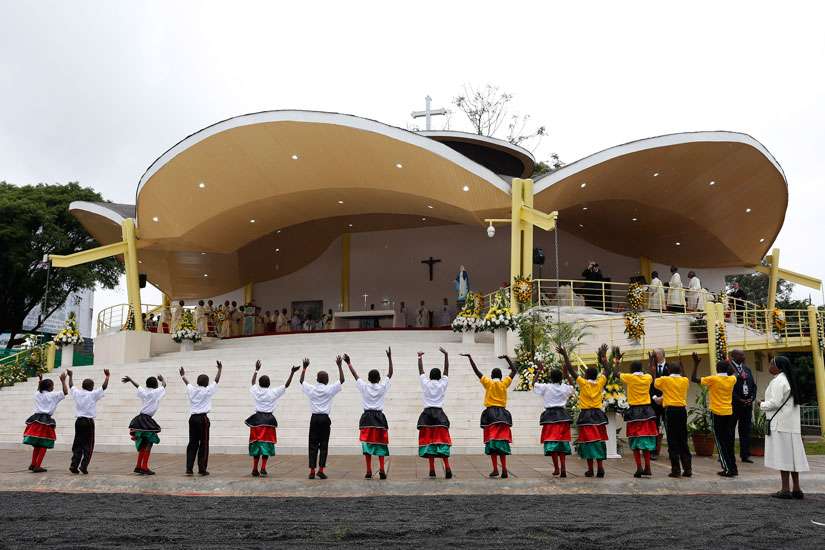Meeting ecumenical and interreligious leaders, celebrating a large outdoor Mass and greeting priests, religious and seminarians in Nairobi Nov. 26, Pope Francis insisted faith means serving one's fellow human beings.
The Pope's day began early on the rainy morning with an intimate meeting with 40 representatives of Kenya's Christian, Muslim, Jewish, Sikh and Buddhist communities, as well as with a Masai elder and other leaders of communities that have maintained their traditional African beliefs.
During the meeting in the Vatican nunciature, Pope Francis remembered the terrorist attacks on Kenya's Westgate Mall in 2013, Garissa University College in April and Mandera in July, and urged a common recognition that "the God who we seek to serve is a God of peace." The Somali-based militant group al-Shabab claimed responsibility for all three attacks the Pope mentioned.
"All too often, young people are being radicalized in the name of religion to sow discord and fear, and to tear at the very fabric of our societies," the Pope said. "How important it is that we be seen as prophets of peace, peacemakers who invite others to live in peace, harmony and mutual respect."
Abdulghafur El-Busaidy, chairman of the Supreme Council of Kenya Muslims, greeted the Pope as "a revolutionary-minded man of God" on behalf of the country's Muslims, who, he said, make up about 30 per cent of the population.
"As people of one God and of this world," he told the Pope, "we must stand up and in unison clasp hands together in all the things that are essential for our collective progress as one humanity, one world irrespective of location, culture, language, race, ethnicity, status, politics ... for we are citizens of the same world."
Peace in the world is not possible without peace among religions, he said, citing the work of "the German philosopher Hans Kung," a Swiss priest whose authority to teach as a Catholic professor in Germany was withdrawn by the Vatican.
The Muslim leader told Pope Francis and the other religious authorities, "There is so much to talk about," but the Pope's schedule allotted only 45 minutes for the gathering. Still, El-Busaidy told Pope Francis and the others, "I wish you success in achieving the vision of a better world you have accepted for yourselves and for future generations.
Anglican Archbishop Eliud Wabukala thanked the Pope for the Catholic Church's efforts to preserve "the apostolic faith" and its commitment to defending marriage and family life "at a time when some of these principles are being called into question."
The centrality of the family and the obligation to be missionaries in word and deed were at the heart of Pope Francis' homily during a Mass celebrated with more than 200,000 people on the grounds of the University of Nairobi. Strong rains overnight and throughout the morning turned the campus lawns into a muddy mess, but that did little to dampen the people's spirits as they sang, swayed, danced and ululated.
The health of a society depends on the health of its families, the Pope said in his homily, which he read in Italian. Msgr. Mark Miles, an official of the Vatican Secretariat of State, alternated with Pope Francis, giving an English translation.
Welcoming children as a blessing and respecting the dignity of each human being should be the marks of Christian families, the Pope said. "In obedience to God's word, we are also called to resist practices which foster arrogance in men, hurt or demean women and threaten the life of innocent children."
"We are called to respect and encourage one another, and to reach out to all those in need," Pope Francis said.
The sacraments, he said, not only strengthen people's faith, they are meant to change people's hearts, making them more faithful disciples as seen in the care they show others.
As followers of Christ, the Pope said, Christians are called to be "missionary disciples, men and women who radiate the truth, beauty and life-changing power of the Gospel. Men and women who are channels of God's grace, who enable His mercy, kindness and truth to become the building blocks of a house that stands firm," a home where people live in harmony as brothers and sisters.
In the afternoon, Pope Francis met with the priests, religious and seminarians of Kenya, a group that included dozens of missionaries, "even from Argentina," said Missionary of Africa Father Felix J. Phiri, chairperson of the Religious Superiors' Conference of Kenya.
The country, which has more than 13.8 million Catholics, is served by more than 5,300 religious women, close to 800 religious brothers, some 2,700 diocesan priests, just over 900 religious-order priests and four permanent deacons.
Welcomed with cheers and the ululations of hundreds of Kenyan sisters, Pope Francis set aside his prepared text and instead reflected on the importance of priests and religious recognizing that the Lord called them to serve and that serving is what their lives must be about.
Ambition, riches and prestige have no place in the life of a priest or religious, Pope Francis said. Anyone who does not think he or she can live a life of poverty, chastity and obedience should leave and start a family, he added.
"When we were called, we were not canonized," the Pope said. Each priest and religious continues to be a person in need of God's mercy and forgiveness, a person who must devote time to prayer. Without prayer, he said, a person becomes as ugly as "a dried fig."
Pope Francis said he could imagine that some of the priests and religious were thinking, "'What a rude Pope. He told us what to do, he told us off and did not even say thank you.' So the last thing I want to say to you, the cherry on the cake, is to thank you for following Jesus, for every time you realize you are a sinner, for every caress you give someone in need."


